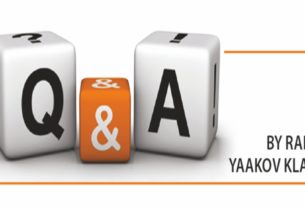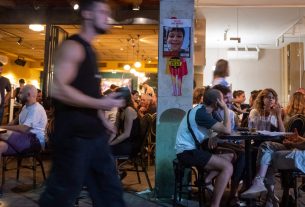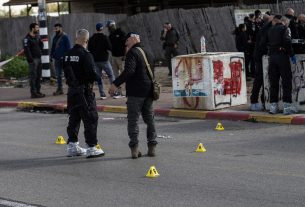((JEWISH REVIEW)) — Kalkidan Tegin wanted to get a few things straight in a recent TikTok video.
Yes, there are Black people who support Israel, the 20-year-old Ethiopian Israeli says emphatically to the camera. Yes, Black Jews like her exist. No, she’s not a convert or an adoptee.
She then responds to critics who claim that Israel mistreats its Black citizens.
“When my grandparents lived all the way in Ethiopia, they were literally hunted and chased and hated just because they were Jews, just because of their religion,” she says. “I lived here in Israel my whole life and I never felt hated. I never felt hunted just because I’m Black.”
In a mock American accent she adds, “It’s insane, right?”
Tegin, who has more than 25,000 TikTok followers, is part of a group of Black Israelis in their 20s and early 30s who have been vigorously defending Israel online — and in English — since its war with Hamas began on Oct. 7. They are an informal but increasingly visible part of Israel’s public diplomacy, known as hasbara, which seeks to defend Israel from criticism and burnish the country’s image overseas, and kicks into high gear during wartime. (TikTok, especially, has become a major online battleground, with a recent analysis showing that pro-Palestinian hashtags are massively outperforming pro-Israel hashtags on the platform.)
In social media posts and TV appearances, they have shared stories about how they and other Black Israelis have been affected by the war. They have called out African-American critics of Israel, including those aligned with the Black Lives Matter movement. They have also pushed back against race-based, anti-Israel narratives spread by pro-Palestinian activists, such as that Israelis are white, European colonizers of land belonging to indigenous Palestinians.
In addition to Tegin, the most prominent Black content creators include Titi Aynaw, an Ethiopian Israeli model and former Miss Israel; Noah Shufutinsky, better known as the rapper Westside Gravy, an African-American Jew who immigrated to Israel last year; Ashriel Moore, a former contestant on Israel’s version of the reality show “The Amazing Race” and a Hebrew Israelite activist; Yirmiyahu Danzig, a Caribbean-American Israeli educator; and Lilaq Logan, an IDF commander with both Jewish and Hebrew Israelite heritage.
While they each have their own politics and communication styles, these creators said in interviews that they are motivated by a desire to raise awareness about Israel’s diverse population. All of them except Aynaw, who did not respond to requests for comment, said they are creating Israel-related content on their own initiative, and that the government is not paying them to do hasbara on its behalf. (Like all soldiers, Tegin and Logan receive wages from the IDF to perform their regular military duties.)
“I was looking to show the world that as strange as it may sound, there are also quite a few Black people in Israel, and we live good lives, so there is no need to use my skin color as an excuse” to criticize the country, Tegin, who lives in Haifa, told the Jewish Telegraphic Agency.
There are more than 200,000 people of African descent who call Israel home, including about 170,000 Ethiopian Jews, 30,000 asylum seekers (primarily from Eritrea and Sudan), 3,000 Hebrew Israelites (Black people who identify as descendants of the ancient Israelites but are not recognized as Jews according to Jewish law), and an unknown number of Black Jewish immigrants from the United States and African countries. There are also people who identify as Afro-Palestinian who live inside Israel’s borders.
Besides the asylum seekers, all of these people trace their genealogical or spiritual roots to the Holy Land. “Most of us see our return to the land of Israel as prophetic,” Moore, who was raised in the African Hebrew Israelite community in Dimona, said in an interview. (The community, which considers Israel to be located in northeastern Africa, is not connected to the radical “Black Hebrew Israelite” groups in the United States whose members denigrate Jews and Israel.)
“Most people view Israel as a European white state, but they don’t realize that we are here as well, we are affected as well,” Moore, 32, said. “The rockets don’t discriminate between people, and those who seek to harm civilians don’t discriminate between us, either.”
Ben Ammi Ben Israel celebrating New World Passover with his followers in Dimona, Israel, May 2013. (Andrew Esensten)
Among the 1,200 Israeli civilians and soldiers slaughtered by Hamas terrorists on Oct. 7 were several Ethiopian Israelis, including Israel Chana, a security guard who was killed while defending the southern town of Ofakim. Soldiers and reservists from the Black Jewish and Hebrew Israelite communities are currently serving in the IDF, and some have been deployed to Gaza. Two Ethiopian soldiers, Aschalwu Sama and paratrooper Yehonatan Yitzhak Semo, have died after being injured in combat.
The war has affected Black communities in other ways. Dozens of African-American Jews who live together in the southern city of Ashkelon were forced to evacuate due to incessant rocket fire from Gaza.
“We came from America seeking to fully express our Judaism,” Monica Terry, who immigrated from Kansas City in 2011 and works as a pharmacist, says in a video Moore posted Oct. 17 to Instagram, where he has more than 80,000 followers. “We’re in Ashkelon, right by Gaza, so we’re used to the occasional missiles and firing. But this time it was different.”
According to Moore, members of Terry’s community were temporarily housed at a school in Herzliya and then hosted by Israeli families. Terry never considered returning to the United States. “This is home to me,” she says in another video. “I’m staying here, regardless of what’s going on, regardless of how close [the war] gets.”
The Hamas assault sent shockwaves through the entire Israeli population. For Black Israelis, the psychological pain has been compounded by seeing rising Palestinian solidarity among Black Americans, including in some cases seemingly pro-Hamas responses shared online by those aligned with the Black Lives Matter movement.
A few days after the Oct. 7 assault, an independent BLM chapter in Chicago posted a meme on X (formerly Twitter) with an image of a figure wearing a parachute above the words “I Stand with Palestine.” It was widely interpreted as glorifying the terrorists who infiltrated Israel on hang gliders. Other BLM-affiliated social media accounts posted messages framing Hamas’ assault as a justifiable act of resistance.
In response to the BLM Chicago post, which the group deleted, Aynaw, the first Black Miss Israel, shared an emotional response on Instagram, where she has 113,000 followers. “I remember you screaming in the streets, ‘I can’t breathe,’” she says in the video, echoing the slogan chanted at racial justice protests, including those in the summer of 2020 following the murder of George Floyd, a Black man, by a white Minneapolis police officer. She concludes by saying, “Pray for Israel, because we can’t breathe.”
The video led to an invitation to appear on Fox News, where Aynaw, 31, called Black Lives Matter supporters who refused to condemn Hamas “hypocrites.” “They say they care about Black people, they say they care about human rights,” she said. “What about my rights as a Black woman in Israel?”
Many Israelis have viewed the decentralized BLM movement with skepticism since at least 2016, when the Movement for Black Lives, a coalition of 60 Black-led organizations, released a platform accusing Israel of committing genocide against Palestinians and being an apartheid state. Israel was the only country mentioned in the foreign policy section of the platform, and Jewish groups across the political spectrum condemned it.
Shufuntinsky, the rapper who grew up in San Diego and now lives in the central coastal city of Hadera, said he supports the principles behind BLM but not any particular organization. Since Oct. 7, he has been angered by the “false equivalency” some activists have drawn between the racial justice movement in the U.S. and the Palestinian national struggle.
“You can’t say Black Lives Matter and then look at the two sides of this conflict and support the side who is killing Black people,” he said in a WhatsApp message.
In a new song he released on Dec. 7, the two-month anniversary of the attack, Shufuntinsky, 24, calls out BLM supporters who are “supposed to be my allies” but who ignore the plight of Israelis like him. “Black Lives Matter sometimes, is what you telling me,” he raps. “My Black life could’ve ended and you’d never mention me / Why? Cause I’m the wrong type of Black / This ain’t got nothing to do with no Republican and Democrat.”
Instead, he raps, it has to do with the perception that “Jews are white.”
The second verse flips the narrative about Jewish colonization of Israel by referencing the Muslim conquest of the Levant in the seventh century. The song, he told (JEWISH REVIEW), is meant to “expose this myth of settler colonialism” and “shine a light on the Black Jewish community,” which he called resilient and “overwhelmingly Zionist.” (Shufutinsky works as the education and outreach manager at the pro-Israel group StandWithUs, but he records and releases music independently.)
Danzig, another American-raised Black Israeli, is a multilingual content creator with more than 46,000 Instagram followers. He educates about Jewish history and Zionism in English and Arabic, and he has called out American celebrities, including rapper Kid Cudi, for describing Israel’s bombardment of Gaza as a “genocide” in an Instagram post.
“Kid Cudi doesn’t care about justice,” he says in a Nov. 6 video. “He’s a pawn in Hamas’ explicit attempt to have an actual genocide [of Jews] between the river and the sea.”
Danzig, 28, also posts people-on-the-street interviews with Palestinians, whom he refers to as his cousins. In one exchange, a Palestinian man calls him an “occupier” in Arabic. He responds, “My great-grandfather was born in the Old City [of Jerusalem]. I’m here since way back!”
The son of an Israeli father and a Guyanese mother, Danzig made aliyah in 2014 and founded an organization last year for Caribbean, West African and African American Israelis called Shachar (“Dawn”). One of the goals of the organization, he said, is to amplify the voices of members of those groups in the media.

Yirmiyahu Danzig, front right, with members of Shachar, a group he founded last year for Caribbean, West African and African American Israelis. (Courtesy)
“When people discuss Israelis, our triumphs and our tragedies, they’re talking about Israelis of color, even if they don’t realize it,” he told (JEWISH REVIEW).
Critics of Israel have left comments on recent videos by Danzig and other Black creators questioning why they would defend a “racist” country. It is a sensitive issue for these creators, who belong to communities that, for different reasons, have faced discrimination and struggled to be fully accepted.
In a poignant contrast, Sama, one of the soldiers killed in Gaza, had previously appeared in an Israeli newspaper — back in 2009, when Israeli schools balked at admitting a recent Ethiopian immigrant first-grader.
Ethiopian Israelis have taken to the streets in recent years to protest racism and police brutality. In July 2019, tens of thousands of Ethiopian Israelis protested for several days following the death of 18-year-old Solomon Tekah, who was shot by an off-duty police officer in Haifa. Some held “I can’t breathe” signs at the protests. This past August, Ethiopian Israelis blocked a highway in Tel Aviv to demand justice in the death of Raphael Adana, a 4-year-old Ethiopian Israeli boy who was struck and killed by an elderly driver in Netanya. Moreover, economic disparities persist between Ethiopian and non-Ethiopian Israelis, with Ethiopian households earning less than the average household.

Israeli protesters compare police violence against African Americans to the killing of Ethiopian Jews, June 2, 2020. (Sam Sokol)
Meanwhile, the African Hebrew Israelites have been battling the Israeli government for more than two years to prevent the deportation of dozens of community members who do not have legal status in the country. Since they are not recognized as Jews, the African Hebrew Israelites are not eligible to receive citizenship under the Law of Return. In 2021, the government threatened to deport those who had entered the country as tourists and stayed illegally. Some received temporary residency last summer, while others are still in limbo. (Most community members hold permanent residency, and the youth are required to enlist in the IDF; the government has extended citizenship to soldiers and their relatives.)
As for the African asylum seekers, the government has held thousands of them in detention centers and sought to deport them en masse. Since Israel considers them to be economic migrants, very few have received refugee status and the rights that come with it. In a rare move last month, Israel’s Interior Minister rewarded Molugata Tsagai, a native of Eritrea, with residency for helping to save the life of an IDF officer who was shot in Sderot during the Hamas invasion.
Prior to Oct. 7, many Black Israeli creators were posting videos about their grievances. Now they are striking a different tone.
“We recognize and speak openly about Israeli society’s flaws,” Danzig said. “None of that justifies the genocidal and racist call to destroy Israel. We will defend our home, because it’s the only home that the Jewish people have.”
Offline, Israel’s Black communities have rallied to support emergency efforts across the country. Asylum seekers have volunteered to harvest food and sort donated goods for those displaced by the war.
The African Hebrew Israelites, who are renowned for their healthy lifestyle, have hosted sound healing sessions in Dimona for Israelis who fled homes near Gaza. Yair Israel, a community member who runs a vegan food manufacturing company, Otentivee, has been delivering free meals to IDF bases for vegan and vegetarian soldiers.

Yair Israel, who runs a vegan food manufacturing company, has been delivering free meals to vegan and vegetarian IDF soldiers. (Courtesy)
“You can’t have a good soldier fighting for you if you don’t feed him right,” Israel said. “I’ve been all over this country taking the people food.” He estimated he has delivered more than 2,000 meals and is raising money to keep the program running.
Logan, the IDF commander who was born to a Jewish father and Hebrew Israelite mother, said she has felt a strong sense of unity in Israel since Oct. 7. But it’s a different story on Instagram, where she has more than 27,000 followers. The 24-year-old said that responding to some pro-Palestinian commenters is “like arguing with a wall.”
Nevertheless, she has been regularly recording reflections on the war in her IDF uniform and red braids. On Dec. 18, she denounced Black Lives Matter activist Shaun King, who has accused Israel of committing genocide and claimed to have helped free two Americans held hostage by Hamas. (The family of the hostages disputes his account of his involvement.) “Are you really for Black Lives Matter? Are you really for human rights? Or are you on the next trend?” Logan asks in a video.
In one of her most viewed videos, she talks about being dismissed by social media users over her identity. “I didn’t really want to get personal with it, but I got a lot of comments talking about, ‘You’re Black, sis, you don’t even belong [in Israel], sit this one out,” she says.
She told (JEWISH REVIEW) she refuses to be quiet. “People are commenting without knowing what it feels like to be attacked in your own home,” she said. “I’m fighting for a greater cause.”




